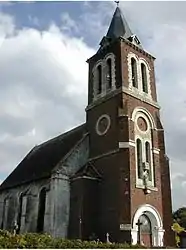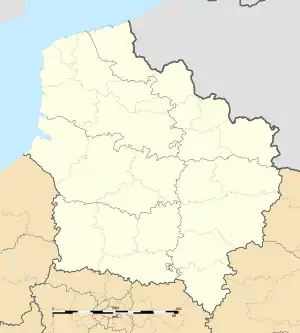Bourecq | |
|---|---|
 The church of Bourecq | |
 Coat of arms | |
Location of Bourecq | |
 Bourecq  Bourecq | |
| Coordinates: 50°34′17″N 2°26′10″E / 50.5714°N 2.4361°E | |
| Country | France |
| Region | Hauts-de-France |
| Department | Pas-de-Calais |
| Arrondissement | Béthune |
| Canton | Lillers |
| Intercommunality | CA Béthune-Bruay, Artois-Lys Romane |
| Government | |
| • Mayor (2020–2026) | Alain Barrois[1] |
| Area 1 | 4.02 km2 (1.55 sq mi) |
| Population | 582 |
| • Density | 140/km2 (370/sq mi) |
| Time zone | UTC+01:00 (CET) |
| • Summer (DST) | UTC+02:00 (CEST) |
| INSEE/Postal code | 62162 /62190 |
| Elevation | 22–49 m (72–161 ft) (avg. 32 m or 105 ft) |
| 1 French Land Register data, which excludes lakes, ponds, glaciers > 1 km2 (0.386 sq mi or 247 acres) and river estuaries. | |
Bourecq (French pronunciation: [buʁɛk]) is a commune in the Pas-de-Calais department in the Hauts-de-France region in northern France.[3]
Geography
A farming village some 10 miles (16 km) northwest of Béthune and 31 miles (50 km) west of Lille, at the junction of the D94E3 and N43 roads, with the A26 autoroute passing by less than a mile away.
Population
| Year | Pop. | ±% |
|---|---|---|
| 1962 | 552 | — |
| 1968 | 565 | +2.4% |
| 1975 | 607 | +7.4% |
| 1982 | 556 | −8.4% |
| 1990 | 560 | +0.7% |
| 1999 | 517 | −7.7% |
| 2009 | 557 | +7.7% |
Sights
- The church of St. Riquier, dating from the twentieth century.
- The remains of the chateau of Malannoy.
- An ancient 16th century manorhouse.
See also
References
- ↑ "Répertoire national des élus: les maires". data.gouv.fr, Plateforme ouverte des données publiques françaises (in French). 9 August 2021.
- ↑ "Populations légales 2021". The National Institute of Statistics and Economic Studies. 28 December 2023.
- ↑ INSEE commune file
Wikimedia Commons has media related to Bourecq.
This article is issued from Wikipedia. The text is licensed under Creative Commons - Attribution - Sharealike. Additional terms may apply for the media files.